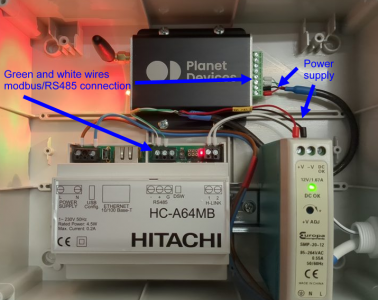No-code, plug-and-play monitoring for your heat pump
The integration of smart technology in UK home energy management, especially for the control and oversight of heat pump systems, is an evolving field. However, this progress is shadowed by increasing frustration among homeowners due to the inadequacy of current heat pump control and oversight capabilities.
As highlighted in multiple discussions on the Renewable Heating Hub forums, some homeowners have ventured into DIY solutions, such as modbus/RS-485 monitoring.
However, these endeavours often prove to be complex and intimidating. For example, cathodeRay describes his experience setting up a modbus monitoring system. This process involves intricate steps like hard wiring a RS-485 to USB converter into the heat pump controller and utilising open-source software for data reading. Although this approach could be effective, it's not a feasible or realistic solution for the average homeowner.
Amidst these challenges, there is a clear demand for monitoring systems that are both straightforward and affordable. Homeowners are looking for solutions that require minimal hardware and software knowledge. The emergence of smart technologies, like PlanetData by Planet Devices, aims to address these challenges in home energy management.

PlanetData functions as a WiFi-enabled Modbus communication gateway, enabling remote access to RTU Modbus enabled heat pumps. It presently supports over 150 heat pump models, with the list continuously expanding, showing its adaptability to various systems.
One of the key features of PlanetData is its ease of installation and use. It's a no-code, plug-and-play device that connects directly to the heat pump hardware and only requires power. This simplicity contrasts sharply with the complex DIY solutions some homeowners have attempted, involving intricate wiring and programming.
PlanetData not only sends and receives data but also allows users to visualise the performance of their heat pumps via a user-friendly dashboard. This dashboard notifies users of any hardware errors, enabling timely interventions. The device can also handle peripherals like CT clamps and indoor temperature probes, providing additional data points crucial for calculating accurate CoP and other efficiency values.
The device also features an optional mains voltage meter to provide a more accurate coefficient of performance calculation. These features empower homeowners with detailed insights into their system’s performance, far surpassing the basic metrics provided by standard heat pump installations.
The ability to store historic data – hourly, daily, weekly, monthly and yearly averages – allows homeowners to engage in predictive maintenance. Applications can optimise energy use and predict maintenance needs, enhancing control over energy consumption.
For homeowners, PlanetData offers a solution that balances sophistication with user-friendliness. It addresses the gap in the market for an effective, accessible heat pump monitoring system. For installers, it provides a comprehensive tool for tracking, maintaining and controlling installations.
PlanetData signifies a significant step in home energy management technology. While innovative, it also focuses on addressing the practical needs of homeowners and installers. As the UK moves towards more sustainable energy solutions, technologies like PlanetData could play a crucial role in making home energy systems more efficient, manageable and user-friendly.
Get a copy of The Ultimate Guide to Heat Pumps
Subscribe and follow our YouTube channel!
Very interesting. The Planet Devices site indicates it is fully compatible with my Ecodan 8.5kw system but is very short on information regarding actual interfacing to the system. Maybe it is all very obvious to people with more ASHP experience. Is it possible to provide some basic details describing how this integrates into an existing system? Thanks
@editor Mars, is this one of those advertising features you mentioned? It reads like one. What would be more helpful is an unbiased review perhaps comparing pros and cons to a well tested system like openenergymonitor.
House-2 bed partial stone bungalow, 5kW Samsung Gen 6 ASHP (Self install)
6.9 kWp of PV
5kWh DC coupled battery
Blog: https://thegreeningofrosecottage.weebly.com/
Heatpump Stats: http://heatpumpmonitor.org/system/view?id=60
@bontwoody, this is not a sponsored or paid for post. I came across their product earlier this week which looked interesting because of all the monitoring dramas we’ve seen in the site, and decided to post an article based on their product literature. I agree about posting an objective review. Our heat pump is not compatible, but I’ll see if they’re willing to send a unit to a homeowner in exchange for an honest review.
Get a copy of The Ultimate Guide to Heat Pumps
Subscribe and follow our YouTube channel!
Very interesting indeed. I think at a basic level it is identical to my system: modbus connection to the heat pump, then read and write data over that connection, possibly even using the same coding language (python). They even have the same tricky to collect data, energy in and indoor air temperature, with similar fixes (use an additional sensor). Interestingly, they don't list Midea as a compatible system, though I am sure it must be.
There are at least three significant differences however:
(1) it is proprietary, ie a black box system (you have no idea what goes on in the black box)
(2) it uses wifi rather than a wire to transmit the data
(3) your data, reading between the lines ends up on their servers
Given (3), it appears that your installer, and very likely Planet Devices, will have access over the system to all your data. This obviously raises questions about privacy (will they sell your data to third parties or even the government?), and who's data is it anyway. Since you can write as well as read over modbus, it also means your installer, and very possibly Planet Devices, can control your heat pump remotely. Potentially useful if these things don't worry you, but in the wrong hands? Pesky customer? Turn up their heating to max at 2am and let them sweat a bit. Of course, no one would do that in practice, would they? But they might do something else. The problem is not where do these things start, but where do they end.
The lack of detail on their website is a bit worrying, but I suppose it is early days. There is also no information that I can see on prices. The business model appears to be Planet Devices sell to installers, and installers sell it to end users.
Midea 14kW (for now...) ASHP heating both building and DHW
@cathoderay, you’ve raised some valid points. I’ve asked Planet Devices to visit the site and answer questions.
Get a copy of The Ultimate Guide to Heat Pumps
Subscribe and follow our YouTube channel!
@editor that would be brilliant Mars! An objective comparison of how accurate the modbus readings are compared to a heat meter would be very informative. Is it compatible with Samsung?
House-2 bed partial stone bungalow, 5kW Samsung Gen 6 ASHP (Self install)
6.9 kWp of PV
5kWh DC coupled battery
Blog: https://thegreeningofrosecottage.weebly.com/
Heatpump Stats: http://heatpumpmonitor.org/system/view?id=60
Posted by: @editorI’ve asked Planet Devices to visit the site and answer questions.
Good thinking. I've also had a look at the connections in the photo, and it looks like a standard two wire modbus/RS485 hookup plus DC power supply:
Midea 14kW (for now...) ASHP heating both building and DHW
Posted by: @bontwoodyIs it compatible with Samsung?
Apparently so, according to their website. Samsung units have a modbus connection via an add-on board.
Midea 14kW (for now...) ASHP heating both building and DHW
@cathoderay I ran a wire just in case when I installed it 😁
House-2 bed partial stone bungalow, 5kW Samsung Gen 6 ASHP (Self install)
6.9 kWp of PV
5kWh DC coupled battery
Blog: https://thegreeningofrosecottage.weebly.com/
Heatpump Stats: http://heatpumpmonitor.org/system/view?id=60
Posted by: @cathoderayVery interesting indeed. I think at a basic level it is identical to my system: modbus connection to the heat pump, then read and write data over that connection, possibly even using the same coding language (python). They even have the same tricky to collect data, energy in and indoor air temperature, with similar fixes (use an additional sensor). Interestingly, they don't list Midea as a compatible system, though I am sure it must be.
There are at least three significant differences however:
(1) it is proprietary, ie a black box system (you have no idea what goes on in the black box)
(2) it uses wifi rather than a wire to transmit the data
(3) your data, reading between the lines ends up on their servers
Given (3), it appears that your installer, and very likely Planet Devices, will have access over the system to all your data. This obviously raises questions about privacy (will they sell your data to third parties or even the government?), and who's data is it anyway. Since you can write as well as read over modbus, it also means your installer, and very possibly Planet Devices, can control your heat pump remotely. Potentially useful if these things don't worry you, but in the wrong hands? Pesky customer? Turn up their heating to max at 2am and let them sweat a bit. Of course, no one would do that in practice, would they? But they might do something else. The problem is not where do these things start, but where do they end.
The lack of detail on their website is a bit worrying, but I suppose it is early days. There is also no information that I can see on prices. The business model appears to be Planet Devices sell to installers, and installers sell it to end users.
I agree with these points - if they exposed the resulting data over MQTT or something (the way that Hildebrand do with their Glow aftermarket smart meters) then this would mitigate point 3, as then the data never needs to leave your home network. It would also make me trust (1) a bit more.
The first thing I would do is deny internet access to this device on my router. There is no need for the data to end up on their servers at all.
Still though this is an order of magnitude better than the current situation, where there is almost no data available to you, and any data you have access to is, well, via your manufacturer's cloud server... I hope they do well, but I also hope that they realise (1) that the sort of weird nerds who are interested in this would also like the ability to keep it all "in house" and tinker with the outputs locally, and (2) that if anyone is thinking of buying a heat pump (or already has one and wants to know if it's working well), they will talk to their weird nerd friend, who may well have bought this device and may well recommend it, should it pass muster. Appealing to the weird nerd crowd at the start then pivoting to a more mainstream offering is a really effective strategy that a lot of tech startups have followed successfully.
ASHP: Mitsubishi Ecodan 8.5kW
PV: 5.2kWp
Battery: 8.2kWh
@mars interesting you picked up on this too. I read up on it a few weeks back. so far as I can tell, its method of connecting to the HP is fundamentally the same as homely so I didn't see it as widely different, just a competitor.
It needs the exact same type modbus connection to the heat pump's internal data bus as homely. Some HP's have this natively, some need an extra module (samsung).
what'll be interesting is if it gives more of a pared-back "monitor" approach rather than the whole super-efficiency-cost-optimised-control of homely.
even better if it exposes it nicely to the home owner. but from what I read on linkedin, they are focusing on the installer market though :-(. be nice if they come on here and discuss.
agree with @scrchngwsl a web front end or api for local data visibility would suit many of us.
there will always be the argument made by some that a Class1 heat meter approach is more accurate than relying on the numbers containing within the heat pump (which is all this will ever get you), but if at least you can reliably and methodically get to those heat pump's numbers, and use them intelligently, then that is a bloomin good start.
My octopus signup link https://share.octopus.energy/ebony-deer-230
210m2 house, Samsung 16kw Gen6 ASHP Self installed: Single circulation loop , PWM modulating pump.
My public ASHP stats: https://heatpumpmonitor.org/system/view?id=45
11.9kWp of PV
41kWh of Battery storage (3x Powerwall 2)
2x BEVs
- 26 Forums
- 2,396 Topics
- 54.3 K Posts
- 337 Online
- 6,077 Members
Join Us!
Worth Watching
Latest Posts
-
RE: Fan is clipping ice build up from the front of unit.
@westkent Thanks. Do you remember what that sensor was ...
By Papahuhu , 2 minutes ago
-
RE: New Mitsubishi Ecodan 11.2kW installation - L9 errors and maybe more
Hi @jamespa - thank you again. Yes, I think it pro...
By anotherdaveuk , 52 minutes ago
-

RE: ASHP Energy Consumption: Aira 12kW heat pump
Indeed. Present ToU tariffs are based on national sup...
By Transparent , 54 minutes ago
-
RE: Help me keep the faith with my air source heat pump installation
@adamk I'm observing my own system at low temperatures ...
By dr_dongle , 1 hour ago
-

RE: Recommended home battery inverters + regulatory matters - help requested
Earthing is definitely a subject which is best approach...
By Transparent , 1 hour ago
-

RE: Running from backup generaor in powercut?
Right on topic, Storm Goretti has done its thing and we...
By Mars , 2 hours ago
-

RE: Free Ecoheat Heat Pump Install
@deltona Yes older houses are problematic like that, bu...
By bontwoody , 21 hours ago
-
RE: Radiator sizing sanity check
As I mentioned early on the cost of supplying and fitti...
By JamesPa , 23 hours ago
-
RE: Advice for a novice on Mitsubishi Ecodan 6kW
I hadn't spotted that there were two pumps in the UFH (...
By JamesPa , 1 day ago
-
RE: Setback savings - fact or fiction?
Never assume it makes an ass of u and me! You need the...
By JamesPa , 1 day ago
-
RE: Electricity price predictions
Great point, one of the key ones in my chat with Octopu...
By Batpred , 1 day ago
-

RE: New Fogstar 15.5kWh upright solution
Let me point out that there are many Chinese suppliers ...
By Transparent , 2 days ago
-

RE: Weather compensation- why you should use it
@majordennisbloodnok — The Two Ronnies Mastermind sketc...
By cathodeRay , 2 days ago
-
Just realised that this image of the cylinder cupboard ...
By Sheriff Fatman , 2 days ago
-

RE: Rodents! A word of warning for heat pump owners
Two thoughts: 1: Let's ask @david-s if Primary Pro in...
By Transparent , 2 days ago
-
RE: Solis S6-EH1P8K-L-PLUS – Why I Chose It and What I’ve Learned So Far
In the diagram below, I describe my understanding of th...
By Batpred , 2 days ago
-
I need to have a look out for it. I know IBM feeds some...
By Batpred , 2 days ago
-
-
RE: Daikin Atherma ASHP Cycling 6 Times an Hour?
Thanks for your reply. Yes that's a good idea to try a...
By John Marshall , 2 days ago
-

RE: Hot water heating in parallel with space heating
An external heat exchanger would need a pump which woul...
By bontwoody , 2 days ago








